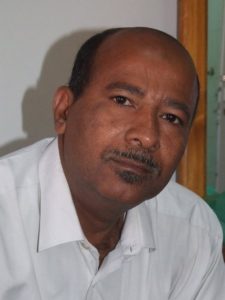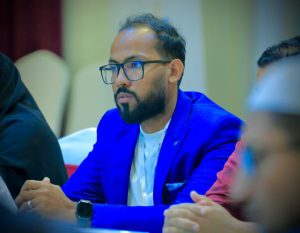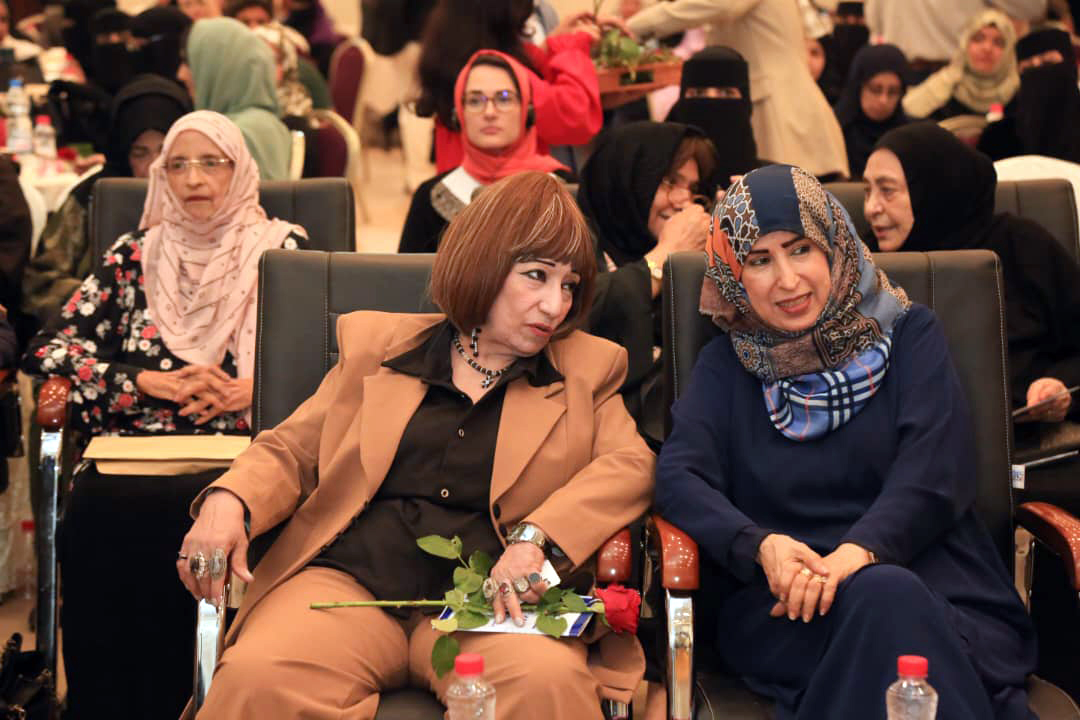Women in Development and Peace – Ahmed Bajoaim
In a time of conflicting voices and increasing divisions, the role of media in promoting opportunities for peace, tolerance, and dialogue becomes prominent. Media will not be effective unless it involves both genders, as Yemeni female journalists have the ability to reach marginalized and underrepresented groups in society, and to present their voices and perspectives on issues that matter to them. All of this will remain incomplete unless the society plays a pivotal role in supporting women’s participation in the media, as it has a positive impact on the community itself by highlighting forgotten issues and making them a matter of public concern.
The role of the Yemeni community in supporting women’s participation in the media lies in several factors, including societal awareness of women’s participation in all aspects of life, including media, as well as the community’s belief in the importance of women’s presence in the midst of the ongoing conflict in the country. Their role and importance lie in highlighting the issues and the most affected groups in the conflict, and the community’s knowledge of the human stories left behind by the conflicting parties. In light of this report, we will learn about the role that the community plays in supporting the participation of Yemeni women in the media.
Available Opportunities
 The deputy head of the Yemeni Journalists Syndicate in Hadhramout Governorate, Salah Buaabs, said that society is the foundation for motivating women, accepting them, and expanding their participation, not only in the media sector but in all sectors and areas of life in general. This stems from the respect of society for women and recognition of their roles, as they are the partners of men and half of society. There are many opportunities for Yemeni women in the diverse media outlets, including radio, television, press, and online platforms, and the female voice is now being heard on the radio, accepted on television, and her writing is being read in newspapers.
The deputy head of the Yemeni Journalists Syndicate in Hadhramout Governorate, Salah Buaabs, said that society is the foundation for motivating women, accepting them, and expanding their participation, not only in the media sector but in all sectors and areas of life in general. This stems from the respect of society for women and recognition of their roles, as they are the partners of men and half of society. There are many opportunities for Yemeni women in the diverse media outlets, including radio, television, press, and online platforms, and the female voice is now being heard on the radio, accepted on television, and her writing is being read in newspapers.
He added, saying, “My remarks are limited to Hadhramout. For example, in radio, women have been present and their presence has been strong and influential since its establishment to this day. In fact, two women have taken the leadership of the official radio station in Al-Mukalla, which is a recognition of their competence and status. Similarly, the recently established satellite channels have opened up new horizons for women, perhaps in a modest and shy manner, but they are present as presenters, producers, coordinators, and program managers. There are distinguished media personalities and journalists who have joined the media work in its various fields. As media institutions develop and become more effective, the opportunities for women’s involvement increase, and this is considered one of the societal roles in supporting women’s participation in journalism and media.”
 Journalist Mohammed Haqas explained that community support for women’s participation in the media contributes to enhancing fair representation and diverse perspectives and experiences, and helps in shaping a balanced and comprehensive image of society. Additionally, women’s involvement in the media can break the constraints and challenges they face and provide positive role models for women in society, helping to change the prevailing stereotypical image of women’s roles. As for the opportunities available for women’s involvement in the media, they are numerous and wide-ranging, even in the midst of the economic downturn that Yemen is experiencing.
Journalist Mohammed Haqas explained that community support for women’s participation in the media contributes to enhancing fair representation and diverse perspectives and experiences, and helps in shaping a balanced and comprehensive image of society. Additionally, women’s involvement in the media can break the constraints and challenges they face and provide positive role models for women in society, helping to change the prevailing stereotypical image of women’s roles. As for the opportunities available for women’s involvement in the media, they are numerous and wide-ranging, even in the midst of the economic downturn that Yemen is experiencing.
Haqas went on to list some job opportunities, saying: “Today, a diverse range of jobs in the field of media is available, such as journalism, television, and radio. These jobs provide women with opportunities to participate and influence in the news and content industry. In addition, the space of social media and blogs gives women the opportunity to express their opinions and ideas and share them with the public and the general opinion. Women can also use these channels to convey their messages and influence others, or to showcase their creativity, talents, and abilities, which enhances their access to prestigious job opportunities in various media, whether domestic or foreign, with ease and convenience.”
 In this regard, journalist Bassel Bamaas pointed out that the importance of community support for Yemeni women in the media lies in the fact that they represent a different narrative that gives a unique character to media content and makes them the focus of comprehensive coverage, especially regarding women themselves. Opportunities in the media field are available to women based on competence and suitability for professional work in various ways. The opportunities for girls to obtain jobs in television are large and more available than for men. Additionally, many Yemeni TV screens lack female representation among their elements, due to customs, traditions, and societal culture that have not helped women to appear except for a few in this field who have been able to overcome barriers.
In this regard, journalist Bassel Bamaas pointed out that the importance of community support for Yemeni women in the media lies in the fact that they represent a different narrative that gives a unique character to media content and makes them the focus of comprehensive coverage, especially regarding women themselves. Opportunities in the media field are available to women based on competence and suitability for professional work in various ways. The opportunities for girls to obtain jobs in television are large and more available than for men. Additionally, many Yemeni TV screens lack female representation among their elements, due to customs, traditions, and societal culture that have not helped women to appear except for a few in this field who have been able to overcome barriers.
 Journalist Omar Al-Khamis commented, saying: “We cannot deny that women are an integral part of this society and are partners with men in construction, prosperity, and adversity. They have been active in their community since ancient times and are not something strange or new. However, there is a complex in some societies that do not see the importance of women. We cannot ignore the role and importance of women in medicine, education, politics, and commerce. Therefore, it is the duty of society to contribute to supporting women in various fields, including the media.
Journalist Omar Al-Khamis commented, saying: “We cannot deny that women are an integral part of this society and are partners with men in construction, prosperity, and adversity. They have been active in their community since ancient times and are not something strange or new. However, there is a complex in some societies that do not see the importance of women. We cannot ignore the role and importance of women in medicine, education, politics, and commerce. Therefore, it is the duty of society to contribute to supporting women in various fields, including the media.
He continued: “Regarding the opportunities for Yemeni women in the media field, they are numerous and they can work from home or in an institution, in news broadcasting, editing, montage, design, directing, recording, and filming. They will work in all media fields without any hindrance, benefiting from the creativity and experience that the media offers. They are successful by all standards as long as they have the desire, determination, and passion. With these factors, they can overcome all social or other obstacles and benefit from the moral support that women receive in various specialties, including media, from the educated elite, academics, and thinkers who see women as active partners in society.”
Difficulties
Deputy head of the Yemeni Journalists Syndicate in Hadhramout, Salah Buaabes, believes that the most important obstacle facing women in our Yemeni society is the limited social perspective. We are still bound by some misconceptions about women in our communities. Another obstacle is the low wages in media institutions, which is not only suffered by women but also by men, given the widening circle of poverty and the declining living standards that affect the majority of the population. In addition, there is a lack of security and increased fear of hostile entities towards the means by which these women work.
Buaabes emphasized that the ongoing conflict in Yemen for the past nine years has led to a restriction of freedom of expression and a lack of acceptance of differing opinions. Additionally, the conflicting parties engage in practices against their critics. All of these issues are considered obstacles that journalists in Yemen, especially female journalists, face. Consequently, these factors lead to parents being apprehensive about allowing their daughters to pursue a career in media, resulting in a weaker presence of women in Yemeni media compared to men.
Journalist Haqas points out that one of the most important difficulties and challenges that female journalists may face is the neglect or restriction in obtaining equal opportunities for leadership positions or creative opportunities. Additionally, some Yemeni media outlets lack sufficient female representation in leadership positions, which can lead to difficulty in achieving gender balance in the media. Moreover, the lack of training, qualification, and practical application affects both genders. Furthermore, media bickering, derogatory language, and similar practices drive many women to leave this profession.
Haqas expressed, “The cultural and social constraints that affect most Yemeni regions and women may reduce or limit their participation in various media outlets. Social restrictions impose on many girls – regardless of their talent and passion – to change their career paths in media and choose other specialties that they may not be convinced of or are not suitable for them. However, they make these changes to satisfy the community even at the expense of their own future. Unfortunately, social constraints have become a controlling factor in the future of girls, and this is one of the difficulties that limit women’s participation in the media.”
Bamaas, on the other hand, said that the difficulties and challenges that hinder women’s participation in the media may be internally originated, meaning that the passion and mental determination of the girl are shaken, allowing any criticism or negative influence from society to eliminate her ambitions. This varies depending on personalities and their ability to respond; some take these criticisms and negative messages as a challenge towards success, and these personalities often succeed, unlike those that are undermined by societal criticisms and merciless words.
In the same context, Omar Al-Khamis commented, “Some difficulties are linked to the woman herself, in terms of family, society, and the diminishing of her role and importance. Some communities in Yemen in general may not accept women’s work, but today we have reached a better stage, especially regarding women in the media. On the other hand, some of the difficulties facing female journalists during their work include the challenge of transportation to locations and events, as well as keeping up with current events. Additionally, there are some institutions that exploit women in need of work by requiring them to work extra hours under physical and mental pressure.”
Treatments
The unionist Buaabes mentioned that the most important treatments provided by society to support women’s participation in the media are improving the level of wages for female workers, involving young girls in training and qualification programs to enhance their professional and practical capacities, as well as raising awareness in the community about the importance of women’s presence in diverse media outlets and not influencing the educational choices of girls. This is because they should see themselves in the right place, not the society, and have all the rights to build their future in the specialization they desire.
On the other hand, the journalist Mohammed Haqas outlined several treatments to enhance women’s participation in the media, including raising societal awareness about the importance of women’s involvement in media and educating about their rights and opportunities through campaigns and educational programs targeting the community. Additionally, encouraging women and providing support through training and educational programs, establishing support networks and platforms for communication and collaboration, as well as promoting the representation of women in the media by appointing them to leadership positions and increasing female supervision. Furthermore, introducing successful female media figures to Yemeni society and highlighting success stories of women.
Bamaas believes that providing women with media literacy and giving them the freedom of movement according to their abilities and skills is one of the important treatments that help women’s participation in the media field. It is also the responsibility of specialized journalism in Yemen, which focuses on social affairs, arts, and literature, to pay attention to female journalists who do not solely focus on conflicts and disputes in their media work.
In conclusion, it can be said that the role of society in supporting women’s participation in the media lies in the importance of the active role that women provide within the community. In addition, there are many community initiatives that seek to enhance women’s presence in the media, the most prominent of which are training courses. Furthermore, the media itself plays an important role in promoting women’s participation by presenting programs and reports that highlight successful experiences of Yemeni women in the media.

